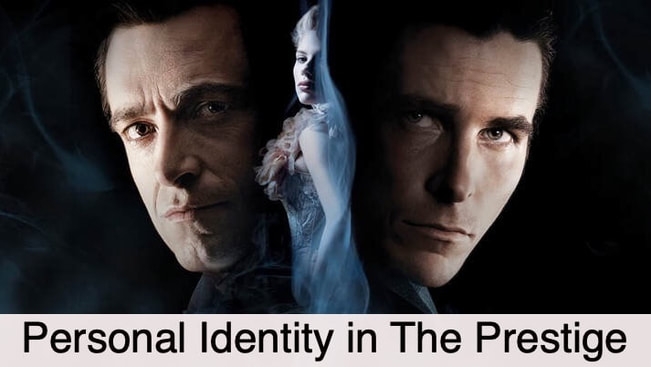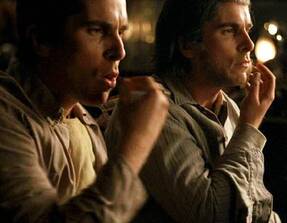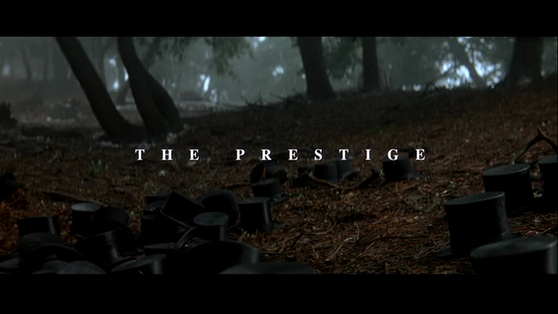Christopher Nolan’s The Prestige (2006) is an impressive cinematic achievement. The film manages to fit a wealth of themes and ideas into a standard run time, focusing on the nature of entertainment, the morality of creativity, and the cost of rising to success. However, the central concept of the film revolves around the theme of personal identity, and it is explored through the developments and opinions of the two main characters. The Prestige presents two different philosophies about the nature of personal identity, one inspired by Derek Parfit, and the other a much more original philosophy, loosely based off of thoughts from David Hume.
In order to understand the philosophies of The Prestige one first needs a crash course on The Prestige, then on what exactly philosophers mean when they say “personal identity”. Hopefully you’ve already seen The Prestige if you’re reading this article, but here’s a refresher. The film is about two rival magicians, Alfred Borden, played by Christian Bale, and Robert Angier, played by Hugh Jackman. The film revolves around their rivalry to become the best magician in the late 19th century. Eventually, Borden develops an impossible trick: “The Transported Man”, where Borden walks through a door on one side of the stage and comes out another door on the other side of the stage instantaneously. Eventually, after a trip to see Nikola Tesla, Angier develops his own version of the trick, involving a cloning machine, which instantaneously clones Angier and generates the clone in a nearby location. At the very climax of the film, we learn how both men did their “Transporting Man” trick. It turns out that Borden was not one man, but two; a set of twins who both dedicated their lives to becoming one man together, all for the sake of this one perfect trick. Angier, however, cloned himself and killed off the old version. But what is most interesting is the characters’ perspectives on their own personal identities.
| The Borden Twins prepare their trick. | Angier steps into his cloning machine. |
While the body theory and the memory theory of persistence are popular ones, they are challenged by the philosophies and ideas presented in The Prestige. Angier’s cloning machine is one such problem. After all, Angier’s clones are entirely psychologically continuous with the original (they have all of the same memories). According to Locke, they ought to be the very same person. This is actually a philosophy that Angier embraces. It is important to remember that Angier kills off the Angier that is cloned after each trick, so that there is only one Angier. The Angier which was copied is killed, and a new Angier takes his place, only to be killed the next time the trick is performed.
However, Angier does not see this as a death. Rather, Angier sees himself as surviving through the trick, because each clone is psychologically continuous. Each copy is just as much Angier as the original was. This seems to be the viewpoint shared by Nikola Tesla earlier in the movie, after Angier has seen the many copies of his hat. Angier asks Tesla which hat is his, to which Tesla replies, “They are all your hat, Mr. Angier” (The Prestige). That is to say that every hat has the same identity as all of the others. Each copy is just as much the same hat as the original. This view also happens to be shared by modern philosopher Derek Parfit. In his book “Reasons and Persons”, Parfit introduces a thought experiment almost identical to the one presented in The Prestige, involving a teleporter which malfunctions and creates two seperate copies of the same man. Parfit argues that since they are psychologically continuous, both versions are the same man, and that if one copy were to be destroyed, the personality and identity of the man would still be alive. It’s an odd concept, and it challenges our typical notions of the Self, but the film presents a fresh and interesting perspective on the problem.
Nolan has created two characters with very interesting philosophies on the self. Angier, who clones himself repeatedly and kills off the cloned copy, sees the self as persistent through memory, not through the body. Angier aligns with the viewpoints of the philosopher Derek Parfit. Alfred Borden, who is in fact two twins assuming the identity of one personality, somewhat aligns with the philosopher David Hume, but has also developed his own philosophy based on his circumstances.
Hume, David. “Of the Immortality of the Soul.” Of the Immortality of the Soul, The University of Adelaide Library, 1777 https://ebooks.adelaide.edu.au/h/hume/david/of-the-immortality-of-the-soul/
Olson, Eric T. “Personal Identity.” Stanford Encyclopedia of Philosophy, Stanford University, 6 Sept. 2019,
www. plato.stanford.edu/entries/identity-personal/.





 RSS Feed
RSS Feed
